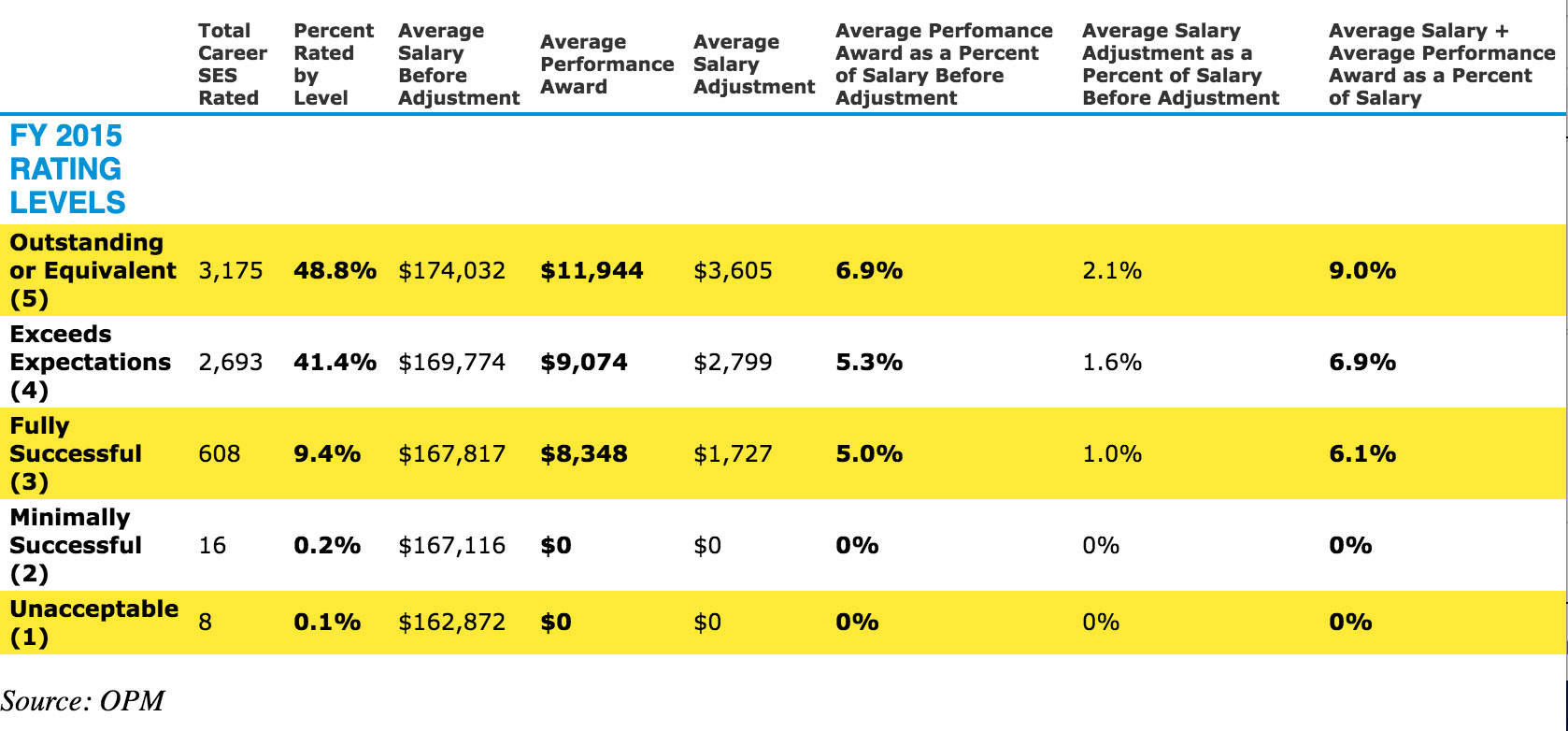71 Percent of Career Senior Executives Received Bonuses in Fiscal 2015
The average individual performance award across government was $10,742, according to new data from OPM.
Slightly more senior executives across the federal government received bonuses in fiscal 2015 than in fiscal 2014, and on average individual awards increased by about $200 over that time, according to the latest data obtained by Government Executive.
Seventy-one percent of the government’s career senior executives earned bonuses based on their job performance in fiscal 2015, up 2.8 percentage points from fiscal 2014, the Office of Personnel Management reported. The average individual performance award for those top career employees in fiscal 2015 was $10,742, up from $10,544 in fiscal 2014, according to the data. The number of all Senior Executive Service members – career, non-career, and limited-term – receiving the highest job performance rating in fiscal 2015 also was up slightly, from 48.6 percent in fiscal 2014 to 49.7 percent.
While the number of career senior executives receiving bonuses and the amount of those bonuses on average increased between fiscal 2014 and fiscal 2015, the growth rate was smaller than it was between fiscal years 2013 and 2014. The percentage of career senior executives receiving a bonus based on their job performance increased by 12.2 percentage points between fiscal years 2013 and 2014, to 68.1 percent, with the average individual performance award increasing $347 between those two years.
Governmentwide, the average rate of basic pay for all SESers in fiscal 2015 inched up to $170,582 from $168,357 in fiscal 2014, but the average salary adjustment as a percent of basic pay was slightly smaller in fiscal 2015: 1.6 percent compared to 1.7 percent in fiscal 2014.
The highest average performance award for career senior executives in fiscal 2015 among agencies reporting data to OPM was $14,748 at the Justice Department. The lowest average performance award in that category was $8,823 at the General Services Administration. The Veterans Affairs Department, which has been under the spotlight when it comes to senior executive compensation since the patient wait-time scandal erupted in 2014, reported an average individual SES performance award of $10,024 in fiscal 2015, which was a little below the governmentwide average. Seventy-four percent of VA senior executives received bonuses; several other large agencies, including the Homeland Security Department, gave bonuses to more than 80 percent of their senior executives.
The fiscal 2015 report included data on 6,378 career senior executives compared to 6,267 career senior executives in fiscal 2014.
Agencies submitted fiscal 2015 rating and pay data for 7,661 SES members (including career, non-career and term-limited SES); of that group, agencies rated 92.2 percent of SES members, with 49.7 percent rated at the highest level (outstanding or equivalent). Agencies overall rated 94.3 percent of their career senior executives, with 48.9 percent of them rated at the highest level in fiscal 2015.
The average performance award in fiscal 2015 for those career senior executives rated at the highest level (outstanding or equivalent) was $11,944. The percentage of career senior executives rated at the highest level varied widely across the government: For instance, the State Department rated 95.8 percent of its senior executives as outstanding or equivalent. At the other end of that spectrum was the VA, rating 10.9 percent of its senior executives at the highest level in fiscal 2015.
Federal budget pressures prompted the Office of Management and Budget in 2011 to cap awards to SES and senior-level scientific and professional employees at no more than 5 percent of their aggregate salaries. It’s worth noting that senior executives are not eligible for locality pay, unlike other federal employees in different pay systems. As for senior executive bonuses, Title 5 of the U.S. Code includes language regarding SES performance awards. “To encourage excellence in performance by career appointees, performance awards shall be paid to career appointees in accordance with the provisions of this section,” states Title 5, Chapter 53, Subchapter 8, Section 5384. “Such awards shall be paid in a lump sum and shall be in addition to the basic pay paid under section 5382 of this title or any award under section 4507 of this title.”
Last year, OPM’s new rules creating a more uniform performance evaluation system across government for senior executives took effect. The standardized performance categories are outstanding, exceeds fully successful, fully successful, minimally satisfactory and unsatisfactory. The new appraisal system requires agencies to consider customer and employee perspectives when evaluating SES managers.
The chart below has more information on fiscal 2015 SES bonuses:
NEXT STORY: TSP Funds Have a Red October









